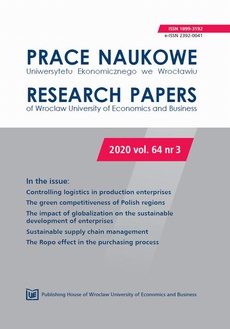POLECAMY

-33%
Managament Enterprises. Social aspects
Wydawca:
Format:
pdf, ibuk
Książka prezentuje zagadnienia związane z szeroko rozumianym zarządzaniem przedsiębiorstwem szczególnie akcentując aspekty społeczne. Zagadnienia te dotyczą między innymi koncepcji przedsiębiorstwa zwinnego w ujęciu klasycznym a także społecznej odpowiedzialności biznesu wobec pracowników przedsiębiorstwa zwinnego, kształtowania funkcji personalnej przedsiębiorstw w warunkach gospodarki wiedzy, wewnętrznej tożsamości organizacyjnej przedsiębiorstwa oraz doskonalenia modelu współpracy przedsiębiorstw. Poruszana w książce problematyka cechuje się oryginalnością w podejściu do rozwiązywanych problemów a zaprezentowana wiedza będąca efektem prac naukowo-badawczych poszczególnych autorów może być użyteczna dla wszystkich osób zainteresowanych omawianą w książce problematyką.
| Rok wydania | 2009 |
|---|---|
| Liczba stron | 86 |
| Kategoria | Zarządzanie, organizacja, strategie |
| Wydawca | Wydawnictwo Politechniki Poznańskiej |
| ISBN-13 | 978-83-7143-869-1 |
| Numer wydania | 1 |
| Język publikacji | polski |
| Informacja o sprzedawcy | ePWN sp. z o.o. |
Ciekawe propozycje
Spis treści
| PREFACE | 5 |
| Agata BRANOWSKA | 7 |
| 1. Corporate social responsibility towards employees of agile enterprises | 7 |
| 1.1. Introduction | 7 |
| 1.2. Human resource management in agile enterprises | 8 |
| 1.3. Human resource management in agile enterprises towards CSR requirements | 10 |
| 1.4. Conclusions13 | |
| References | 14 |
| Juha HUUMONEN | 17 |
| 2. Managing agility of enterprise | 17 |
| 2.1. Introduction | 17 |
| 2.2. Agility components – general aspects | 18 |
| 2.3. Agility components towards opportunities and knowledge management | 22 |
| 2.3.1. Intelligence of Enterprise | 22 |
| 2.3.2. Brightness of Enterprise | 23 |
| 2.3.3. Opportunities and knowledge management | 25 |
| 2.3.4. Flexibility and Shrewdness of Enterprise | 27 |
| 2.4. The measurement conception of enterprise agility components | 28 |
| 2.5. Conclusions | 33 |
| References | 34 |
| Katarzyna RAGIN-SKORECKA | 37 |
| 3. Research on the internal organizational identity structure | 37 |
| 3.1. Introduction | 37 |
| 3.2. The identity structure and its shaping for management in the organization | 40 |
| 3.3. The internal corporate identity structure – research results | 47 |
| 3.4. Conclusions | 55 |
| References | 57 |
| Hanna WŁODARKIEWICZ-KLIMEK | 59 |
| 4. Shaping the personal function of contemporary enterprieses in the knowledgebased economy conditions | 59 |
| 4.1. The features of knowledge-based economy | 59 |
| 4.2. Functioning of the enterprise in a knowledge-based economy | 60 |
| 4.3. Human capital as the factor of changes and progress | 61 |
| 4.4. Specificity of knowledge management in the context of realization the personal function in the organization | 62 |
| 4.5. Shaping the personal function in knowledge-based organizations | 66 |
| 4.6. Conclusions | 67 |
| References | 68 |
| Małgorzata WIŚNIEWSKA | 71 |
| 5. Improving the business enterprises’ cooperation model | 71 |
| 5.1. The principles of cooperation organizing | 71 |
| 5.1.1. The principles of goal formulation | 73 |
| 5.1.2. The principles of planning the course of action | 74 |
| 5.1.3. The principles of obtaining people and means to achieve goals and organizing the structure of action | 75 |
| 5.1.4. The principle of goal realization – implementation | 75 |
| 5.1.5. The principles of action control and the result reached in it | 76 |
| 5.2. Improving the model of business cooperation | 78 |
| 5.3. Conclusions | 83 |
| References | 84 |
























